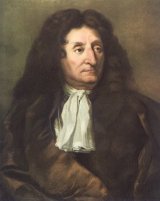An Animal In The Moon.
Jean de La Fontaine 1621 (Château-Thierry) – 1695 (Paris)
While one philosopheraffirms
That by our senses we're deceived,
Anotherswears, in plainest terms,
The senses are to be believed.
The twain are right. Philosophy
Correctly calls us dupes whene'er
Upon mere senses we rely.
But when we wisely rectify
The raw report of eye or ear,
By distance, medium, circumstance,
In real knowledge we advance.
These things hath nature wisely plann'd -
Whereof the proof shall be at hand.
I see the sun: its dazzling glow
Seems but a hand-breadth here below;
But should I see it in its home,
That azure, star-besprinkled dome,
Of all the universe the eye,
Its blaze would fill one half the sky.
The powers of trigonometry
Have set my mind from blunder free.
The ignorant believe it flat;
I make it round, instead of that.
I fasten, fix, on nothing ground it,
And send the earth to travel round it.
In short, I contradict my eyes,
And sift the truth from constant lies.
The mind, not hasty at conclusion,
Resists the onset of illusion,
Forbids the sense to get the better,
And ne'er believes it to the letter.
Between my eyes, perhaps too ready,
And ears as much or more too slow,
A judge with balance true and steady,
I come, at last, some things to know.
Thus when the water crooks a stick,
My reason straightens it as quick -
Kind Mistress Reason - foe of error,
And best of shields from needless terror!
The creed is common with our race,
The moon contains a woman's face.
True? No. Whence, then, the notion,
From mountain top to ocean?
The roughness of that satellite,
Its hills and dales, of every grade,
Effect a change of light and shade
Deceptive to our feeble sight;
So that, besides the human face,
All sorts of creatures one might trace.
Indeed, a living beast, I ween,
Has lately been by England seen.
All duly placed the telescope,
And keen observers full of hope,
An animal entirely new,
In that fair planet, came to view.
Abroad and fast the wonder flew; -
Some change had taken place on high,
Presaging earthly changes nigh;
Perhaps, indeed, it might betoken
The warsthat had already broken
Out wildly o'er the Continent.
The king to see the wonder went:
(As patron of the sciences,
No right to go more plain than his.)
To him, in turn, distinct and clear,
This lunar monster did appear. -
A mouse, between the lenses caged,
Had caused these wars, so fiercely waged!
No doubt the happy English folks
Laugh'd at it as the best of jokes.
How soon will Mars afford the chance
For like amusements here in France!
He makes us reap broad fields of glory.
Our foes may fear the battle-ground;
For us, it is no sooner found,
Than Louis, with fresh laurels crown'd,
Bears higher up our country's story.
The daughters, too, of Memory, -
The Pleasures and the Graces, -
Still show their cheering faces:
We wish for peace, but do not sigh.
The English Charles the secret knows
To make the most of his repose.
And more than this, he'll know the way,
By valour, working sword in hand,
To bring his sea-encircled land
To share the fight it only sees to-day.
Yet, could he but this quarrel quell,
What incense-clouds would grateful swell!
What deed more worthy of his fame!
Augustus, Julius- pray, which Caesar's name
Shines now on story's page with purest flame?
O people happy in your sturdy hearts!
Say, when shall Peace pack up these bloody darts,
And send us all, like you, to softer arts?
Font size:
Submitted on August 03, 2020
Modified on April 05, 2023
- 3:03 min read
- 97 Views
Quick analysis:
| Scheme | ABABCDEEDAAFFGGHHEEDCIIJJAAKKDDCGCGLLDDAAKKMNNMAAKOPPQQQEEKKRSAADDTTAAAACUUUCCAAEAAVFFVWWYYYAAA |
|---|---|
| Closest metre | Iambic tetrameter |
| Characters | 3,235 |
| Words | 600 |
| Stanzas | 1 |
| Stanza Lengths | 95 |
Translation
Find a translation for this poem in other languages:
Select another language:
- - Select -
- 简体中文 (Chinese - Simplified)
- 繁體中文 (Chinese - Traditional)
- Español (Spanish)
- Esperanto (Esperanto)
- 日本語 (Japanese)
- Português (Portuguese)
- Deutsch (German)
- العربية (Arabic)
- Français (French)
- Русский (Russian)
- ಕನ್ನಡ (Kannada)
- 한국어 (Korean)
- עברית (Hebrew)
- Gaeilge (Irish)
- Українська (Ukrainian)
- اردو (Urdu)
- Magyar (Hungarian)
- मानक हिन्दी (Hindi)
- Indonesia (Indonesian)
- Italiano (Italian)
- தமிழ் (Tamil)
- Türkçe (Turkish)
- తెలుగు (Telugu)
- ภาษาไทย (Thai)
- Tiếng Việt (Vietnamese)
- Čeština (Czech)
- Polski (Polish)
- Bahasa Indonesia (Indonesian)
- Românește (Romanian)
- Nederlands (Dutch)
- Ελληνικά (Greek)
- Latinum (Latin)
- Svenska (Swedish)
- Dansk (Danish)
- Suomi (Finnish)
- فارسی (Persian)
- ייִדיש (Yiddish)
- հայերեն (Armenian)
- Norsk (Norwegian)
- English (English)
Citation
Use the citation below to add this poem to your bibliography:
Style:MLAChicagoAPA
"An Animal In The Moon." Poetry.com. STANDS4 LLC, 2024. Web. 27 Jul 2024. <https://www.poetry.com/poem/55773/an-animal-in-the-moon.>.



Discuss the poem An Animal In The Moon. with the community...
Report Comment
We're doing our best to make sure our content is useful, accurate and safe.
If by any chance you spot an inappropriate comment while navigating through our website please use this form to let us know, and we'll take care of it shortly.
Attachment
You need to be logged in to favorite.
Log In